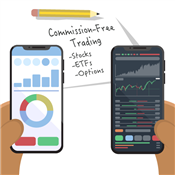Is Robinhood Safe?
Are you worried about the safety of your investments? Let's examine the security features of Robinhood to determine if it's a reliable choice. Read on.
 |
Robinhood has become a go-to choice for many investors because of its user-friendly interface and commission-free trading.
But when it comes to safety, you may have some concerns. What did Robinhood do after the 2021 data breach and system failure?
In this article, let's take a look at how secure Robinhood is. Let's examine its regulatory affiliations and privacy protocols. This way, you can decide if you feel comfortable using Robinhood as your trading platform.
Is Robinhood Safe for Investors?
Robinhood is considered a safe trading platform. It is registered with trusted institutions such as the SEC, FINRA, and SIPC.
But that's not all! Robinhood has gone the extra mile to improve security and customer support. It implemented fraud screening procedures. This has enabled Robinhood to catch any unauthorized trading.
So when considering Robinhood as your trading platform, it's important to understand how some rules and regulations work together to safeguard your investments. Let's take a closer look at the details.
Robinhood Safety Measures
Here are the data privacy and protection safety measures employed by Robinhood. You can also check out their SEC and FINRA compliance, along with the added security of SIPC and FDIC insurance (for uninvested cash through FDIC-insured program banks).
Cybersecurity Measures
Data protection and privacy is one of Robinhood's top priorities. They are committed to safeguarding their users' sensitive information by implementing robust security measures. Here are some:
- Data encryption
To safeguard sensitive information, such as Social Security numbers, Robinhood encrypts this data before storing it. Encryption involves encoding the information into a secure secret code that can only be accessed by authorized parties.Robinhood uses a special system called Transport Layer Security (TLS).[1] TLS makes sure that when you use their app or website, any information you send to their servers stays private. Examples are your passwords or bank account details.
Is it safe to give your SSN to Robinhood?
While Robinhood uses encryption to protect your data, including your SSN, you should still be cautious and research before sharing sensitive information online. - Password Security
When you create a password for your account, Robinhood uses a special scrambling method called hashing. It's putting your password through a secret code blender that makes it hard for anyone to figure out what it is.Your passwords are not stored as plain text. So even if someone were to get access to its systems, they wouldn't be able to read or understand your password.
- Two-factor Authentication (2FA)
Robinhood employs two-factor authentication (2FA) as an added layer of security for user accounts. So when you log in or make changes to your account, it requires two pieces of information to confirm your identity.How does 2FA work?
First, you enter your password (something you know). And then, a unique code or request approval is sent to your trusted device (something you have). This way, even if someone manages to get hold of your password, they won't be able to access your account without the additional verification.Robinhood automatically enables 2FA for new devices to make sure it's you trying to sign in. It helps ensure that unauthorized people can't access your account.
Regulatory Oversight
Robinhood abides by the rules and regulations of the Security and Exchange Commission and Financial Industry Regulatory Authority.
- Security and Exchange Commission (SEC) Regulation
The SEC's role is to ensure that Robinhood acts appropriately as a broker and a public company.Robinhood is required to follow the rules and regulations set by the SEC. This includes submitting reports to the SEC every year. If Robinhood violates these rules, the SEC may impose fines or other penalties.
- Financial Industry Regulatory Authority (FINRA) Membership
FINRA is a regulatory group that oversees brokerage platforms such as Robinhood. FINRA assures the platform's compliance with rules and regulations related to trading securities, like stocks and bonds.It also regulates the individuals who advise or guide clients regarding securities transactions. So, being a member of FINRA is an added oversight for both the platform and the people involved.
Insurance Coverage
Your investments and other assets with Robinhood are insured under SIPC for your stocks and FDIC for your uninvested cash (through a cash sweep to FDIC-insured program banks). Let's explore how this coverage works to provide additional protection for your funds.
- Securities Investor Protection Corporation (SIPC)
Robinhood Financial LLC and Robinhood Securities, LLC are part of a group that protects your stocks and other securities investments. This group is called the Securities Investor Protection Corporation (SIPC). Basically, if something goes wrong and your investments are at risk, SIPC steps in to provide some level of protection.SIPC covers your securities (like stock) up to $500,000 which includes cash claims up to $250,000.[2] So you're generally covered if you have stock or other securities worth less than $500,000.And Robinhood added another safeguard. It purchased an additional insurance policy to supplement the SIPC coverage. This extra insurance applies if the SIPC limits are reached. It provides additional protection for your securities and cash, up to $1 billion.[3]
Overall, Robinhood is taking steps to provide additional protection beyond what SIPC offers. It's a way to give you peace of mind that your investments are safe.
Take note of these limits in the insurance:- It can only give you a maximum return of $50 million in securities including $1.9 million in cash. So if you have investments worth more than those amounts, you might not be fully covered for the excess.
- It's also important to note that this extra insurance doesn't protect you if your investments' value drops due to market changes. It's more focused on protecting you from certain risks related to the custody of your assets.
- It can only give you a maximum return of $50 million in securities including $1.9 million in cash. So if you have investments worth more than those amounts, you might not be fully covered for the excess.
- FDIC Insurance
The main goal of FDIC insurance is to protect your uninvested cash to the best extent possible.In its cash sweep program, Robinhood deposits your unspent, or uninvested cash, in certain banks. This way, your money is safe and eligible for insurance coverage.
Under this program, the Federal Deposit Insurance Corporation (FDIC) can insure your uninvested cash for up to $2 million.
However, please keep in mind that there are certain limits to how much the FDIC and banks can insure.
Each bank in the program can provide coverage of up to $250,000, including any deposits you already have in that bank under the same ownership.While each bank can insure up to $250,000, a small portion of that amount, specifically $2,000, is set aside for any interest that may have accrued on your cash. So the actual insurance coverage for your cash might be slightly lower.
Also, if you opt out of one or more of the program banks, it could affect the amount of FDIC insurance coverage you have. So make sure to consider that if you want to change your participation in the cash sweep program.
Is my money safe with Robinhood?
Robinhood's membership in FINRA safeguards your uninvested funds on the platform, while its membership in SIPC provides security for your invested money.[4] However, there are limitations to these protections. Reviewing Robinhood's rules and regulations regarding these securities is recommended.
Risks in using Robinhood
While regulations and security measures can help reduce the chances of getting hacked, you must stay vigilant. Even with these safeguards in place, there are instances where skilled hackers can find ways to bypass them. Here are a few examples:
- Data Breach Incident
In November 2021, hackers got hold of a list of Robinhood users. It included email addresses for about 5 million people and names for around 2 million people. Robinhood found out that some of the entries in the list have phone numbers, and there are other bits of information in the list that they're still looking into.But here's the important part: Robinhood is confident that the list didn't have any Social Security numbers, bank account numbers, or debit card numbers. So, customers haven't suffered any financial losses because of this incident.
- Outages and System Failures
In 2021, FINRA found out that Robinhood did not properly oversee its technology. It had outages and system failures that led to "false or misleading" information and weak controls for options trading. This affected millions of customers and some of them may have lost money. Robinhood faced a penalty of about $70 million as a result.[5]Can Robinhood be hacked?
Robinhood experienced a data breach in late 2021, where millions of email addresses, names, and other sensitive information were compromised. After the incident, Robinhood updated its systems to enhance data privacy and security measures.
Alternatives to Robinhood
If you're not satisfied with Robinhood's security measures, you may check out other options such as the ones listed below.
- eToro
eToro is a popular social trading platform that allows users to trade a variety of assets, including stock, cryptocurrencies, commodities, and more.One of its unique features is the ability to engage in social trading, where users can see and even automatically copy the trades of successful investors. This feature allows novice traders to learn from experienced traders and potentially replicate their strategies.
eToro also offers a user-friendly interface, a wide range of educational resources, and a virtual trading feature for practice.
- Webull
Webull is an online brokerage platform with advanced trading tools and features. It provides commission-free trading for stock, ETFs, and options.Webull's unique features include real-time market data, customizable charts, technical analysis indicators, and the ability to trade on margin. It also has extended trading hours. It allows users to trade before and after regular market hours.
Active traders and those interested in in-depth market analysis often prefer Webull.
- Fidelity
Fidelity is a well-established brokerage firm that offers a wide range of investment options and services. It provides access to stocks, mutual funds, ETFs, bonds, and more.Fidelity is known for its research and educational resources, helping investors make informed decisions. The platform offers a user-friendly interface, advanced trading tools, retirement planning tools, and access to professional investment advice.
Take note that the features and services offered by these platforms may change over time.
Deposit $100 and Get $10 from eToro USA LLC
- Sign up for an eToro account
- Deposit $100
J.P. Morgan Self-Directed Investing - Get Up to $700
- Get up to $700 when you open and fund a J.P. Morgan Self-Directed Investing account with qualifying new money.
- $700 when you fund with $250,000 or more
- $325 when you fund with $100,000-$249,999
- $150 when you fund with $25,000-$99,999
- $50 when you fund with $5,000-$24,999
- Get unlimited commission-free online stock, ETF, fixed income, and options trades when you open an account.
- $0 Online Commission trades
- Choose an account that's right for you: General Investing, Traditional IRA or Roth IRA.
- Access our secure, easy-to-use trading experience online or through the Chase Mobile® app.
- Our powerful tools and resources are built to help you take control of your investments.
INVESTMENT AND INSURANCE PRODUCTS ARE:
Deposit and Get 15 Free Stocks plus 8.1% APY on uninvested cash
Enroll in Cash Sweep to enjoy 4.1% APY base rate plus 4.0% APY booster for the first 3 months after opening your account
Make a net deposit of $1,000 or more to receive 15 draws, each for a free stock worth $2 - $2,000 each. Maintain average assets totaling $1,000 or more for 60 days to unlock the free stocks.
This offer is available to new and existing customers who have not opened a brokerage account before May 29, 2024, 04:00 ET, or who have opened a brokerage account but have not made a deposit or an ACATS transfer yet and plan to make the first deposit or ACATS transfer that settles before March 31, 2025, 23:59 PM ET. Terms and conditions apply.
40 Free Fractional Shares
Open a new Webull individual brokerage account. Make a single initial deposit of $2,000 or more during the promotional period to get 40 fractional shares, each valued between $3 - $3,000. Maintain a balance of at least $2,000 in the account for 30 days or more. Terms and conditions apply.
All Ages - Banking and Invest in One App
- Flexible controls, spending notifications, in-app chore list
- Age: No minimum age
- Fees: Starts at $5.99/month, per family (up to 5 kids). $9.98/month for Greenlight Max. $14.98 per month for Greenlight Infinity.
Bottom Line
When evaluating the safety of Robinhood, it is essential to consider several factors. These include cybersecurity measures and regulatory oversight.
To keep user data safe, Robinhood uses encryption. Its SIPC membership also ensures protection for the invested funds. However, you must still stay cautious when sharing sensitive information online and research any platform before investing.
Recent data breaches show that no platform is completely free from security risks. Reviewing Robinhood's rules, regulations, and security measures is wise. Or you may consider other brokerage platforms. These can help you make an informed decision about your investments.
Finally, talking with a financial advisor can provide personalized guidance based on your unique needs and circumstances.
References
- ^ Robinhood. How you're protected, Retrieved 9/18/23
- ^ SIPC. What SIPC Protects, Retrieved 9/2/2023
- ^ Robinhood. How you're protected, Retrieved 9/2/2023
- ^ Robinhood. Brokerage cash sweep program interest rate (APY), Retrieved 9/18/23
- ^ FINRA, Retrieved 9/18/23
$20 Investment Bonus
- Open an Acorns account (new users only)
- Set up the Recurring Investments feature
- Have your first investment be made successfully via the Recurring Investments feature
Deposit $100 and Get $10 from eToro USA LLC
- Sign up for an eToro account
- Deposit $100
Invest in Real Estate with $10+
- Only $10 minimum investment
- Get a diversified portfolio of real estate projects across the US
- Open to all investors
Write to Miel Ysabel at feedback@creditdonkey.com. Follow us on Twitter and Facebook for our latest posts.
Note: This website is made possible through financial relationships with some of the products and services mentioned on this site. We may receive compensation if you shop through links in our content. You do not have to use our links, but you help support CreditDonkey if you do.
eToro is a multi-asset platform which offers both investing in stocks and cryptoassets, as well as trading CFDs.
Please note that CFDs are complex instruments and come with a high risk of losing money rapidly due to leverage. 51% of retail investor accounts lose money when trading CFDs with this provider. You should consider whether you understand how CFDs work, and whether you can afford to take the high risk of losing your money.
This communication is intended for information and educational purposes only and should not be considered investment advice or investment recommendation. Past performance is not an indication of future results.
Copy Trading does not amount to investment advice. The value of your investments may go up or down. Your capital is at risk.
Don’t invest unless you’re prepared to lose all the money you invest. This is a high-risk investment and you should not expect to be protected if something goes wrong. Take 2 mins to learn more
eToro USA LLC does not offer CFDs and makes no representation and assumes no liability as to the accuracy or completeness of the content of this publication, which has been prepared by our partner utilizing publicly available non-entity specific information about eToro.
|
|
| ||||||
|
|
|
Compare:














